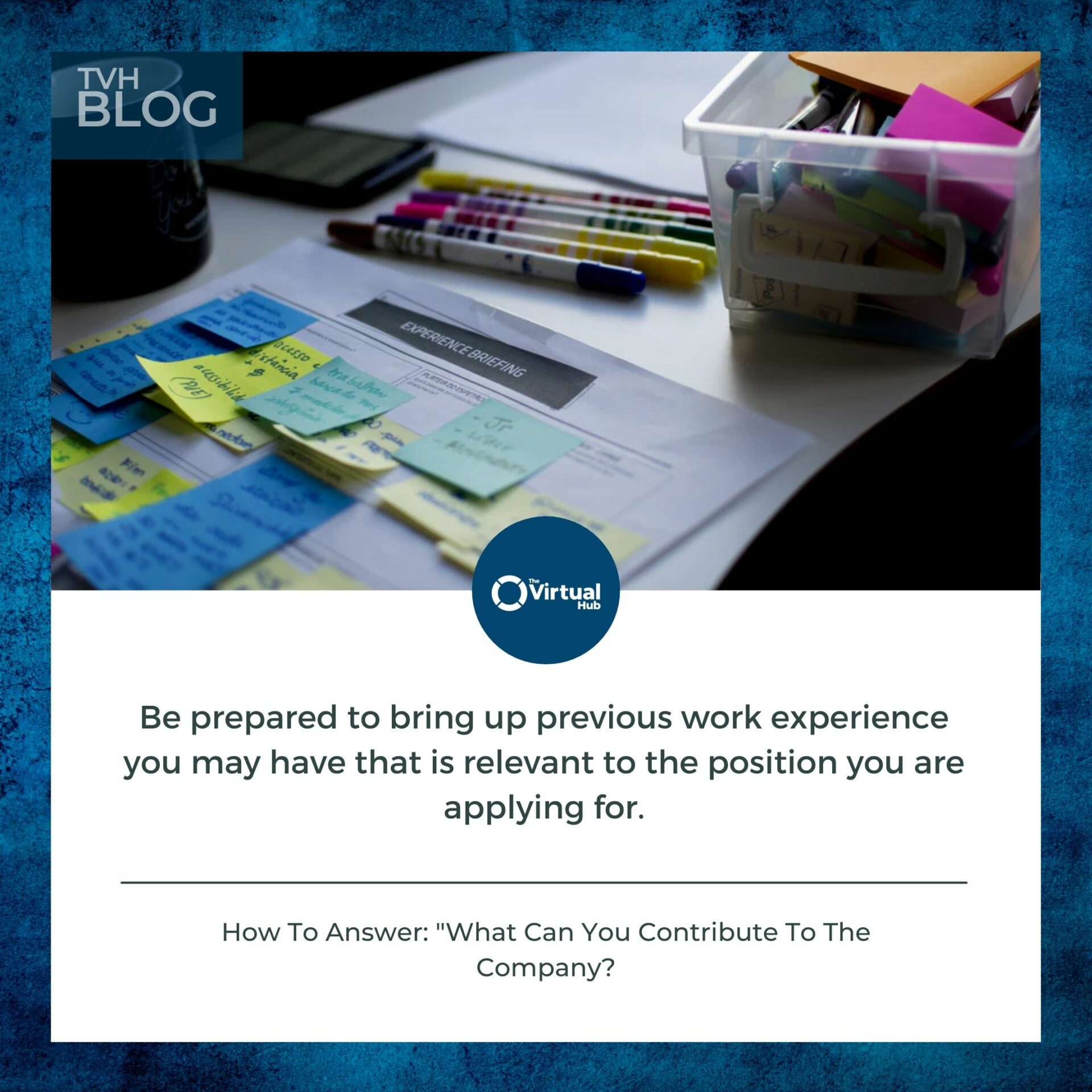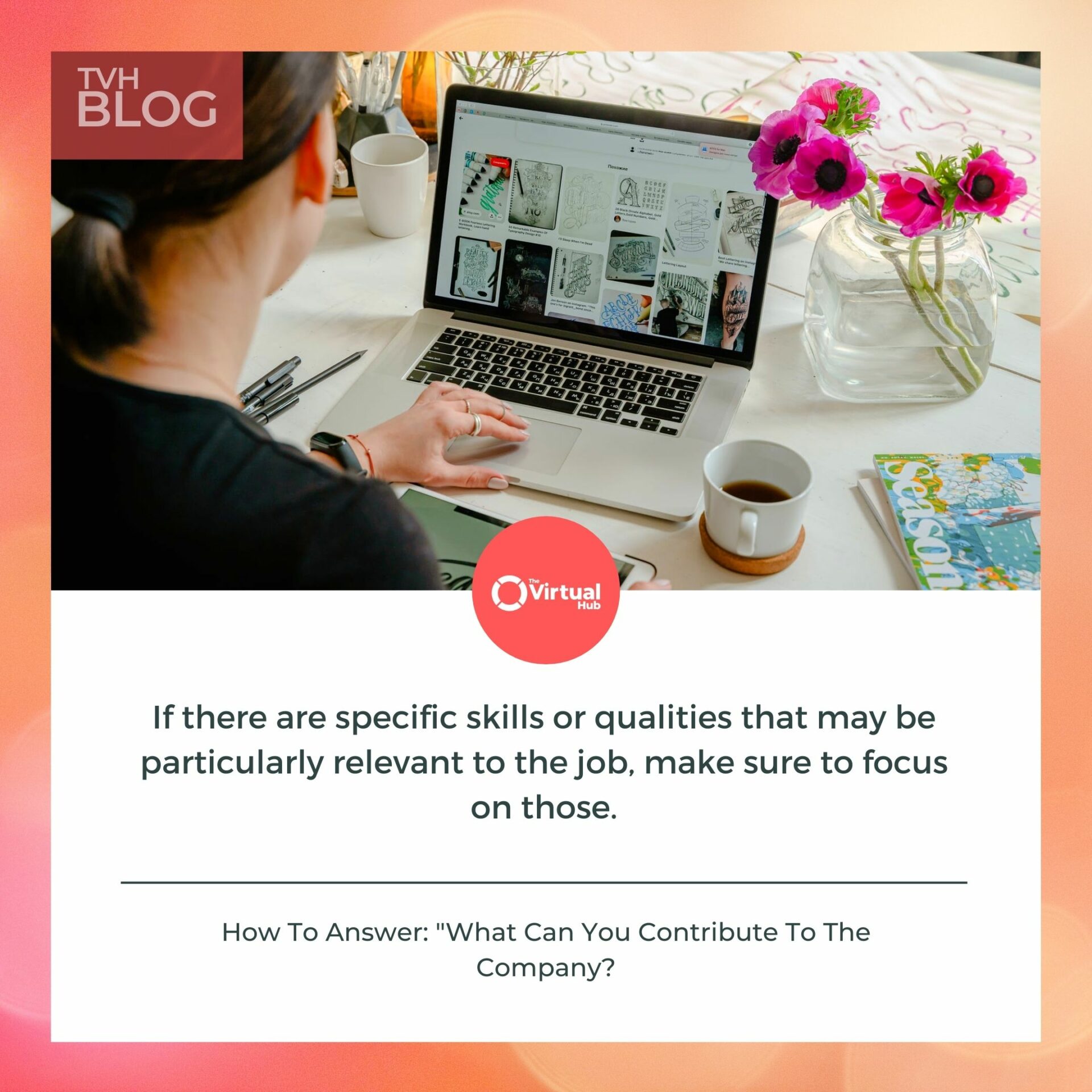How To Answer: “What Can You Contribute To The Company?”

One of the most common job interview questions a hiring manager might ask is, “What can you contribute to the company?” While the question may seem a bit daunting, it’s actually one of the best questions you can capitalize on.
Here’s how you can give the perfect answer to that question, ace that interview, and ultimately, land your dream job!
RELATED: How To Answer: “What Is Your Greatest Weakness?” in a Job Interview
Answering the Question “What Can You Contribute to This Company?” | The Complete Guide
You can click on these links below to jump on a specific section:
What The Interviewer Really Wants to Know
Employers would typically choose to interview a particular candidate based on his or her resume and skills. When an interviewer asks the question, “What can you contribute to the company?” they want you to dive deeper than what’s on paper.
The company interviewing you wants to discover exactly how you can be an asset to the team should they choose to hire you. For most positions excluding entry-level jobs, the ideal hires are those who bring extensive experience.
Interviewers ask this very typical interview question because they want to learn what you’re bringing to the table. At the same time, they also want to gauge whether your values are aligned with the company’s values.
Employers would usually look beyond the applicant’s resume to measure his or her qualifications. How you fit into the company culture, whether or not you exemplify teamwork, your dedication to your chosen profession, how you meet challenges… employers look at all these when deciding whether you’re a qualified candidate or not.
More than evaluating the content of your answer, they’ll also evaluate the way you delivered your answer. Did you respond with confidence? Were you able to cite specific examples to support your claims? Were the actions in your examples aligned with the company’s mission?
Note how a simple question was able to bring out so much in a candidate. That’s why it’s important that you prepare yourself well for a question like this.
The STAR Interview Technique
The STAR Interview Response Method, otherwise known as the STAR Interview Technique, is a short guide on how to answer questions during an interview. STAR simply stands for:
-
- Situation: Start by describing a certain situation that happened at work.
- Task: Narrate what you decided to do to address that situation.
- Action: Describe how you were able to complete the task.
- Result: Detail the outcomes of the situation.
Admittedly, the STAR method doesn’t show what you should say when asked, “What can you contribute to the company?” However, it provides a good template you can follow when you do give an answer.

Tips to Follow to Ace That Interview Question
To get your dream job, you want to make sure that the interviewer is impressed by your answer. Keep in mind the following tips when you answer the question, “What can you contribute to this company?”:
1. Learn about the Company and the Role You’re Applying For
The last thing you want to do is to come to an interview unprepared. Before attending that meeting, make sure to research the company you’re applying for.
Every employer would be pleased to know that an applicant has done his or her homework. Employers typically look for people who are actually interested in the company, and not just in making money.
As an applicant, take a few moments to get to know the business you’re applying in. Do your due diligence: Find out what the company’s current goals are, who it serves, the working environment, their accomplishments, what kind of products or services they provide, and many more!
From there, look at the job description to understand exactly what you’d be doing if you get hired for that role. This’ll be a great opportunity later to make sure that your answers are tailored to the particular job for which you’re applying.
2. Discuss Your Skills and Achievements
While your resume may already list your skills, they don’t expound on how you were able to utilize them to bring value to the business.
Your resume already shows that you have flexibility, organizational skills, communication skills, and many more. When you answer, avoid stating cliches like “I have my energy, integrity, and leadership.” No one wants to hear these anymore!
Instead, describe how your organizational skills helped you organize an event or how your communication skills helped promote diplomacy and resolve a conflict between employees in the workplace.
If you know you’re good at something, then don’t be afraid to show it off. Just make sure you come across as someone who’s enthusiastic, not arrogant.
3. Match Your Credentials to the Job Requirements
Remember, an employer is looking for someone who meets the company’s specific needs.
Before the interview, review the job requirements listed in the posting and compare them to your experience. From there, decide which of your qualifications you should emphasize during the meeting.
The goal here is to make sure that what you discuss in the interview aligns with what they’re looking for in a candidate. A compelling answer will make the employer realize that you’re perfect for the job.
Be prepared to bring up work experience in your previous company that may be relevant to the position you’re applying for. Show them your past accomplishments, and with your knowledge of the objectives of the company, highlight how you think the same can be beneficial to this business.
You could say, “I can bring not only my ideas but also the knowledge and experience I’ve gained from my other jobs that can help improve this company” or “I devised strategies that helped scheduling client appointments more efficiently, which resulted to a decrease in scheduling errors, and I’d love to apply not only this method but also my general passion for engineering to this role.”
Your goal should be to impress your potential employer. Don’t be afraid to let them know of the accomplishments you have in your past jobs, as well as the accomplishments you hope to have should the company choose to hire you.

4. Demonstrate How Your Skills Fit with This Specific Company
It’s not enough to just talk about your skills and qualifications. You also have to demonstrate how your background and experience can help the company succeed.
Make sure you explain, in detail, how you could bring all of those experiences over to this particular company and make an impact on their success. Be aware that what worked in another business may not be the same for this company.
Again, job interviews are about more than just elevating yourself. It’s also a way for interviewers to gauge whether or not you fit into the culture of the company. It’s an opportunity for you to show that you have depth.
When asked how you can contribute to the company, make sure to connect your answers with the employer’s goals. Furthermore, make sure you’re able to demonstrate that your values are aligned with that of the company.
For example, you could say, “I understand the importance of expanding international sales for your company. My previous experience as a global liaison for an organization has made me well versed in the nuances of working with clients from different countries and cultures. I helped improve international sales figures by 15% in my prior role, and I’m confident I could bring the same level of success to your team.”
By emphasizing how you can help the company reach its goals, you show employers that you’re not only qualified for the job, but also motivated and capable of contributing to the organization’s mission.
5. Emphasize What You’ve Accomplished
Never forget to give concrete examples of your accomplishments. Go into specifics. This is a great way of painting a picture of the kind of work that you’ll do for your potential employer.
Describe how you were able to show your effectiveness in your previous job. If you were able to come up with an innovation, show leadership, or exceed your goals, let the interviewer know about them.
Were you able to implement new business practices that helped streamline office processes? Did you come up with new programs that benefited the lives of other employees? Share them!
Don’t be afraid to discuss the breadth of related experience you may have. Highlight your strong points. Finally, make sure to end by emphasizing that these are the kinds of accomplishments you want to bring to the company.

6. Use Data
If possible, back up your claims with data. This is often true for those who have sales background.
Were you able to raise a team’s sales by a certain percentage? Were you able to cut turnaround time of a particular process? Let them know by how much.
Some sample answers you can use are:
-
- “I successfully increased a company’s sales record by 20% in a single quarter.”
- “I was able to reduce response times from customers by 25% through the implementation of a new system.”
- “I was able to reduce turnaround time for X job from 4 days to 2 days.”
- “I cut costs of production processes by 30%.”
Having numbers to backup your claims is a great way of giving examples of how you can contribute to the company. If you can get more specific, go for it. This’ll make you more convincing and memorable to the interviewer, and it’ll emphasize the kind of impact you can have on a company.
Don’t forget to include details such as timelines and metrics so that your interviewer can have an idea of what type of work you did. Make sure that these statements are directly linked with the role you’re applying for—this’ll help establish how you could contribute to the team should they decide to hire you.
7. Keep Your Answer Simple
As a professional, you most likely have a ton of achievements and experiences under your belt. However, when it comes to answering the question, “What can you contribute to this company?”, it’s important to focus only on what’s important.
Keep in mind that these interviews are most likely timed. You have to find a way to make sure that you make as much of that time as possible.
This may mean leaving out some of your best skills if they’re not relevant to the question. Instead, focus on the skills, experiences, and anecdotes that are aligned with the position for which you’re applying.
RELATED: How To Answer ‘What Motivates You?’ In A Job Interview

What Not To Say
Finally, here are some things you should avoid when answering interview questions:
Letting Your Ego Get in the Way
While it’s important to sell yourself, don’t make your answers all about you. Avoid coming across as arrogant. When you respond, be flexible. It’s easier to showcase your skills and accomplishments when you don’t come off as arrogant or boastful. You don’t want to make it seem as if your way is the only way.
Being Too Modest
On the flip side of not letting your ego get in the way is being too modest. Yes, it’s important to be humble and honest; however, don’t undersell yourself either! Make sure that you emphasize your strengths without sounding arrogant, and still highlight your past achievements and qualifications. Remember, this is an opportunity for you to showcase how great you are. You want to make sure that whoever interviews you knows exactly why they should hire you.
Talking Too Much
When answering questions, make sure that you don’t go on and on. There’s a big difference between confidently answering an interview question and talking too much.
Stick to the point and try not to add any unnecessary details. Be clear, direct, and show that you understand the challenges of the position. You want to give succinct answers that focus on the key points.
Answering in Generalities
Enough with the cliches. Avoid using generic responses like “I’m a great team player” or “I’m willing to learn.” Instead of being general, focus on providing examples of how you’ve demonstrated those specific qualities in your other positions. This’ll give more depth to your answer and show the interviewer that you’re competent and capable of taking on assignments.
Sharing Examples Irrelevant to the Job
Sharing examples of your strongest qualities is great, but don’t go too far off-topic. Make sure that everything you mention relates to the question at hand and the job for which you’re applying. Don’t just tell a story about leadership if it’s not related to the question being asked (even if it’s a good attribute to have).
Final Thoughts
When it comes to interviewing, impressing the interviewer is key. It’s important that you demonstrate your value during the interview, and make sure that they understand why you’re a great fit for the job.
Knowing how to answer the question “What can you contribute to the company?” helps show that you’ve done your research about the role, its requirements, and how you can help meet those needs. By focusing on what makes you unique and relevant, as well as backing up your claims with tangible examples, you’ll be sure to stand out from all the other candidates, and set the stage for job search success!
Now that you know how to answer the question “What can you contribute to this company?”, it’s time put your research skills to the test and find a role that suits your skillset!
And what better place to start than here at The Virtual Hub? We’re always looking for talented individuals who want to help us change the way businesses operate. So, if you think you have what it takes, we’d love to hear from you! Click here to learn more about joining our team!

0 Comments